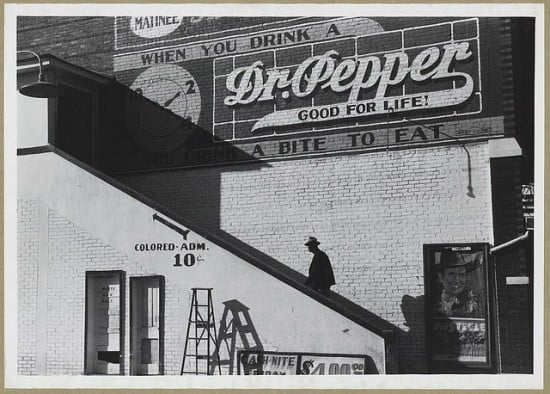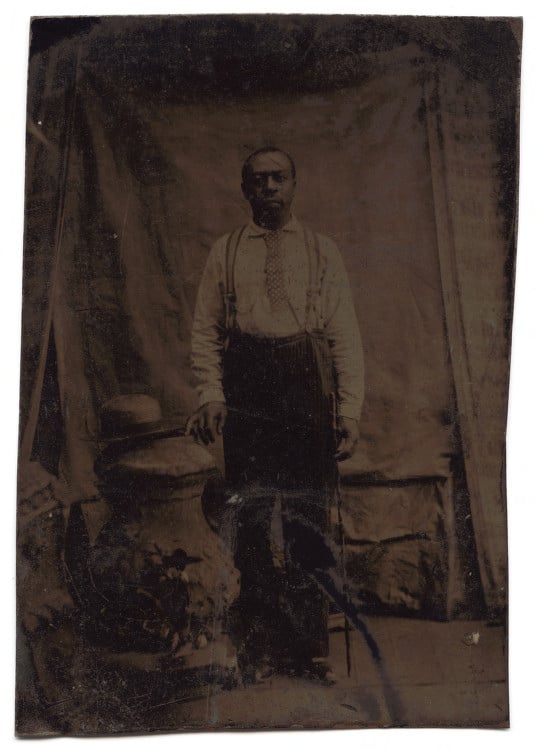The Comet (1)
By:
May 21, 2013
HILOBROW is pleased to present the first installment of our serialization of “The Comet,” a 1920 science fiction story by W.E.B. DuBois, the most important black protest leader in the United States during the first half of the 20th century. “The Comet” was originally published as the tenth chapter of Du Bois’s avant-garde fiction, poetry, and autobiographical collection Darkwater: Voices From Within the Veil. New installments will appear each Tuesday for five weeks.
SUBSCRIBE to HILOBROW’s serialized fiction via RSS.
ALL INSTALLMENTS: 1 | 2 | 3 | 4 | 5
He stood a moment on the steps of the bank, watching the human river that swirled down Broadway. Few noticed him. Few ever noticed him save in a way that stung. He was outside the world — “nothing!” as he said bitterly. Bits of the words of the walkers came to him.
“The comet?”
“The comet —”
Everybody was talking of it. Even the president, as he entered, smiled patronizingly at him, and asked:
“Well, Jim, are you scared?”
“No,” said the messenger shortly.
“I thought we’d journeyed through the comet’s tail once,” broke in the junior clerk affably.
“Oh, that was Halley’s,” said the president; “this is a new comet, quite a stranger, they say — wonderful, wonderful! I saw it last night. Oh, by the way, Jim,” turning again to the messenger, “I want you to go down into the lower vaults today.”
The messenger followed the president silently. Of course, they wanted him to go down to the lower vaults. It was too dangerous for more valuable men. He smiled grimly and listened.
“Everything of value has been moved out since the water began to seep in,” said the president; “but we miss two volumes of old records. Suppose you nose around down there, — it isn’t very pleasant, I suppose.”
“Not very,” said the messenger, as he walked out.
“Well, Jim, the tail of the new comet hits us at noon this time,” said the vault clerk, as he passed over the keys; but the messenger passed silently down the stairs. Down he went beneath Broadway, where the dim light filtered through the feet of hurrying men; down to the dark basement beneath; down into the blackness and silence beneath that lowest cavern. Here with his dark lantern he groped in the bowels of the earth, under the world.
He drew a long breath as he threw back the last great iron door and stepped into the fetid slime within. Here at last was peace, and he groped moodily forward. A great rat leaped past him and cobwebs crept across his face. He felt carefully around the room, shelf by shelf, on the muddied floor, and in crevice and corner. Nothing. Then he went back to the far end, where somehow the wall felt different. He sounded and pushed and pried. Nothing. He started away. Then something brought him back. He was sounding and working again when suddenly the whole black wall swung as on mighty hinges, and blackness yawned beyond. He peered in; it was evidently a secret vault — some hiding place of the old bank unknown in newer times. He entered hesitatingly. It was a long, narrow room with shelves, and at the far end, an old iron chest. On a high shelf lay the two missing volumes of records, and others. He put them carefully aside and stepped to the chest. It was old, strong, and rusty. He looked at the vast and old-fashioned lock and flashed his light on the hinges. They were deeply incrusted with rust. Looking about, he found a bit of iron and began to pry. The rust had eaten a hundred years, and it had gone deep. Slowly, wearily, the old lid lifted, and with a last, low groan lay bare its treasure — and he saw the dull sheen of gold!
“Boom!”
A low, grinding, reverberating crash struck upon his ear. He started up and looked about. All was black and still. He groped for his light and swung it about him. Then he knew! The great stone door had swung to. He forgot the gold and looked death squarely in the face. Then with a sigh he went methodically to work. The cold sweat stood on his forehead; but he searched, pounded, pushed, and worked until after what seemed endless hours his hand struck a cold bit of metal and the great door swung again harshly on its hinges, and then, striking against something soft and heavy, stopped. He had just room to squeeze through. There lay the body of the vault clerk, cold and stiff. He stared at it, and then felt sick and nauseated. The air seemed unaccountably foul, with a strong, peculiar odor. He stepped forward, clutched at the air, and fell fainting across the corpse.
He awoke with a sense of horror, leaped from the body, and groped up the stairs, calling to the guard. The watchman sat as if asleep, with the gate swinging free. With one glance at him the messenger hurried up to the sub-vault. In vain he called to the guards. His voice echoed and re-echoed weirdly. Up into the great basement he rushed. Here another guard lay prostrate on his face, cold and still. A fear arose in the messenger’s heart. He dashed up to the cellar floor, up into the bank. The stillness of death lay everywhere and everywhere bowed, bent, and stretched the silent forms of men. The messenger paused and glanced about. He was not a man easily moved; but the sight was appalling! “Robbery and murder,” he whispered slowly to himself as he saw the twisted, oozing mouth of the president where he lay half-buried on his desk. Then a new thought seized him: If they found him here alone — with all this money and all these dead men — what would his life be worth? He glanced about, tiptoed cautiously to a side door, and again looked behind. Quietly he turned the latch and stepped out into Wall Street.
How silent the street was! Not a soul was stirring, and yet it was high-noon — Wall Street? Broadway? He glanced almost wildly up and down, then across the street, and as he looked, a sickening horror froze in his limbs. With a choking cry of utter fright he lunged, leaned giddily against the cold building, and stared helplessly at the sight.
RADIUM AGE SCIENCE FICTION: “Radium Age” is HILOBROW’s name for the 1904–33 era, which saw the discovery of radioactivity, the revelation that matter itself is constantly in movement — a fitting metaphor for the first decades of the 20th century, during which old scientific, religious, political, and social certainties were shattered. This era also saw the publication of genre-shattering writing by Edgar Rice Burroughs, Sax Rohmer, E.E. “Doc” Smith, Jack London, Arthur Conan Doyle, Aldous Huxley, Olaf Stapledon, Karel Čapek, H.P. Lovecraft, Charlotte Perkins Gilman, Yevgeny Zamyatin, Philip Gordon Wylie, and other pioneers of post-Verne/Wells, pre-Golden Age “science fiction.” More info here.
READ GORGEOUS PAPERBACKS: HiLoBooks has reissued the following 10 obscure but amazing Radium Age science fiction novels in beautiful print editions: Jack London’s The Scarlet Plague, Rudyard Kipling’s With the Night Mail (and “As Easy as A.B.C.”), Arthur Conan Doyle’s The Poison Belt, H. Rider Haggard’s When the World Shook, Edward Shanks’ The People of the Ruins, William Hope Hodgson’s The Night Land, J.D. Beresford’s Goslings, E.V. Odle’s The Clockwork Man, Cicely Hamilton’s Theodore Savage, and Muriel Jaeger’s The Man with Six Senses. For more information, visit the HiLoBooks homepage.
SERIALIZED BY HILOBOOKS: Jack London’s The Scarlet Plague | Rudyard Kipling’s With the Night Mail (and “As Easy as A.B.C.”) | Arthur Conan Doyle’s The Poison Belt | H. Rider Haggard’s When the World Shook | Edward Shanks’ The People of the Ruins | William Hope Hodgson’s The Night Land | J.D. Beresford’s Goslings | E.V. Odle’s The Clockwork Man | Cicely Hamilton’s Theodore Savage | Muriel Jaeger’s The Man With Six Senses | Jack London’s “The Red One” | Philip Francis Nowlan’s Armageddon 2419 A.D. | Homer Eon Flint’s The Devolutionist | W.E.B. DuBois’s “The Comet” | Edgar Rice Burroughs’s The Moon Men | Charlotte Perkins Gilman’s Herland | Sax Rohmer’s “The Zayat Kiss” | Eimar O’Duffy’s King Goshawk and the Birds | Frances Hodgson Burnett’s The Lost Prince | Morley Roberts’s The Fugitives | Helen MacInnes’s The Unconquerable | Geoffrey Household’s Watcher in the Shadows | William Haggard’s The High Wire | Hammond Innes’s Air Bridge | James Branch Cabell’s Jurgen | John Buchan’s “No Man’s Land” | John Russell’s “The Fourth Man” | E.M. Forster’s “The Machine Stops” | John Buchan’s Huntingtower | Arthur Conan Doyle’s When the World Screamed | Victor Bridges’ A Rogue By Compulsion | Jack London’s The Iron Heel | H. De Vere Stacpoole’s The Man Who Lost Himself | P.G. Wodehouse’s Leave It to Psmith | Richard Connell’s “The Most Dangerous Game” | Houdini and Lovecraft’s “Imprisoned with the Pharaohs” | Arthur Conan Doyle’s “The Sussex Vampire”.
ORIGINAL FICTION: HILOBROW has serialized three novels: James Parker’s The Ballad of Cocky The Fox (“a proof-of-concept that serialization can work on the Internet” — The Atlantic); Karinne Keithley Syers’s Linda Linda Linda (which includes original music); and Robert Waldron’s roman à clef The School on the Fens. We also publish original stories and comics. These include: Matthew Battles’s stories “Gita Nova“, “Makes the Man,” “Imago,” “Camera Lucida,” “A Simple Message”, “Children of the Volcano”, “The Gnomon”, “Billable Memories”, “For Provisional Description of Superficial Features”, “The Dogs in the Trees”, “The Sovereignties of Invention”, and “Survivor: The Island of Dr. Moreau”; several of these later appeared in the collection The Sovereignties of Invention | Peggy Nelson’s “Mood Indigo“, “Top Kill Fail“, and “Mercerism” | Annalee Newitz’s “The Great Oxygen Race” | Flourish Klink’s Star Trek fanfic “Conference Comms” | Charlie Mitchell’s “A Fantasy Land” | Charlie Mitchell’s “Sentinels” | Joshua Glenn’s “The Lawless One”, and the mashup story “Zarathustra vs. Swamp Thing” | Adam McGovern and Paolo Leandri’s Idoru Jones comics | John Holbo’s “Sugarplum Squeampunk” | “Another Corporate Death” (1) and “Another Corporate Death” (2) by Mike Fleisch | Kathryn Kuitenbrouwer and Frank Fiorentino’s graphic novel “The Song of Otto” (excerpt) | John Holbo’s graphic novel On Beyond Zarathustra (excerpt) | “Manoj” and “Josh” by Vijay Balakrishnan | “Verge” by Chris Rossi, and his audio novel Low Priority Hero | EPIC WINS: THE ILIAD (1.408-415) by Flourish Klink | EPIC WINS: THE KALEVALA (3.1-278) by James Parker | EPIC WINS: THE ARGONAUTICA (2.815-834) by Joshua Glenn | EPIC WINS: THE MYTH OF THE ELK by Matthew Battles | TROUBLED SUPERHUMAN CONTEST: Charles Pappas, “The Law” | CATASTROPHE CONTEST: Timothy Raymond, “Hem and the Flood” | TELEPATHY CONTEST: Rachel Ellis Adams, “Fatima, Can You Hear Me?” | OIL SPILL CONTEST: A.E. Smith, “Sound Thinking | LITTLE NEMO CAPTION CONTEST: Joe Lyons, “Necronomicon” | SPOOKY-KOOKY CONTEST: Tucker Cummings, “Well Marbled” | INVENT-A-HERO CONTEST: TG Gibbon, “The Firefly” | FANFICTION CONTEST: Lyette Mercier’s “Sex and the Single Superhero”


